GLAAD Awards NYC 2013: Madonna, Degrassi Lesbians, and Trans* Representation
As a team, we’ve been extra excited about the GLAAD Media Awards this year because for the first time ever, Autostraddle dot com is nominated! However, my own personal excitement about the award shows went through the roof when Laneia emailed me and inquired if I would like to attend the NYC show to photograph our very own lovely Lizz interviewing celebs on the red carpet. Would I like to do that? Hello, did Tumblr crash when Quintana finally happened? Which is to say yes, yes I would like that very much.
So Lizz traveled all the way from Med School Land to my humble abode in Brooklyn, and on Saturday afternoon we trekked off on our journey to find Madonna, befriend power lesbians and bring you the best and the brightest coverage from one of three shows GLAAD puts on to celebrate the year in LGBT media. Are you ready for this? Cuz we sure weren’t!
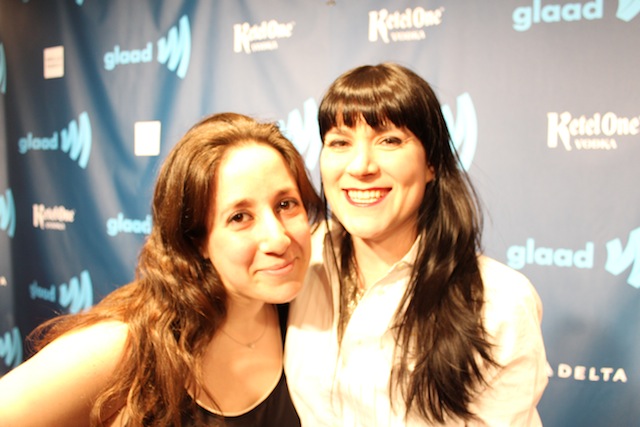
we were really really excited and also totally petrified
Neither Lizz nor I had ever attended an awards show before, so we had no idea what to expect. We learned lots of things over the course of the night: If you act like you know what you’re doing people will believe you (and will let you check your coat in the fancy coat room that may or may not have been legit for us to use), a lot of people on the GLAAD staff read Autostraddle, and even at LGBT events, The Patriarchy can totally still plague you in the form of random white dudes who will take up space and try to steal your interviews. Life is so educational! Anyhow, the 2013 NYC GLAAD Media Awards were really fun, and we felt super honored to attend and get the chance to chat with a lot of really influential humans in the LGBT community and media world. Mr. Anderson Silver Fox Cooper didn’t grant interviews and Madonna didn’t even show up on the red carpet, but we did get to chat with a lot of really badass humans, and we took photos with a bunch of them too!
First we spoke with Jennifer Tyrrell, the lesbian mom who started a petition after being removed from her role as a Boy Scouts troop leader because of the BSA’s ban on homosexuals. We spoke with Tyrrell last summer and she was really sincere and inspiring, so we were psyched to get a chance to catch up with her almost a year later, as the BSA still hasn’t come to a satisfying decision. We complimented her snazzy rainbow tie and her sons’ adorable bowties (they were supposed to wear matching rainbow ties too, but the ones Tyrrell ordered never arrived in the mail!) then asked her what she thinks the future looks like for the Boy Scouts of America.
It’s so hard to predict because the BSA has been an institution in America for 100 years and unfortunately it has been run by good old boy type attitudes…I’ve been heartbroken so many times by their constant upset. I’m going to assume that if they don’t make the right decision in May, there are going to be a lot of upset people. I really think it’s going to be chaos for them. We’re going to keep working, I’m not going anywhere until everyone is accepted…I don’t want any kid to go through what Cruz has been through, so that’s whats gotta be done. Truthfully, I think you can’t train the leaders of our future with values and bigotry from a 100 years ago. It just doesn’t work.
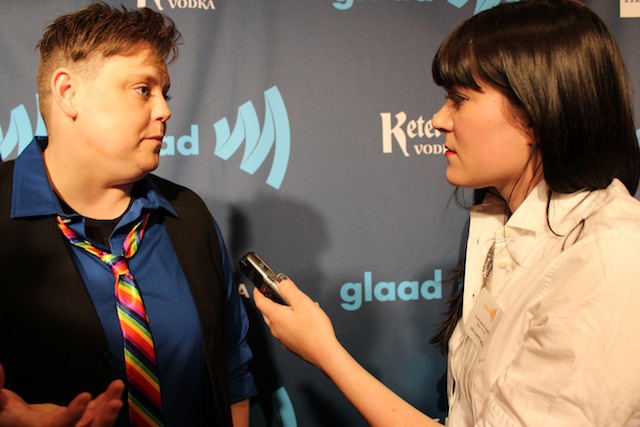
later in the evening jen gave lizz an inspirational pep talk and assured her she wouldn’t die alone so basically jen is the sweetest
copyright vanessa friedman
Then we found Wilson Cruz, aka Rickie from My So-Called Life, and he totally referred to us as “his girls.” Yes, we did die of excitement, obviously.
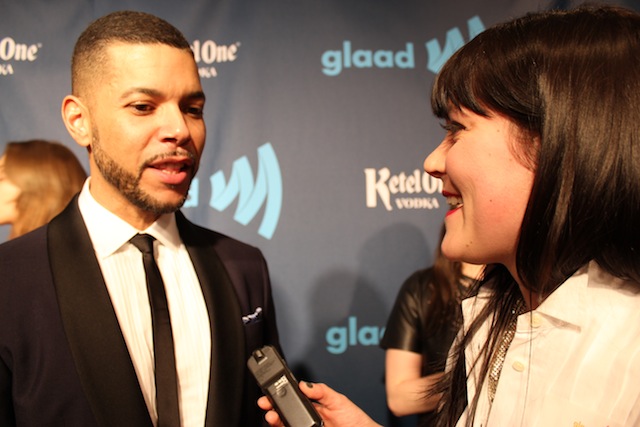
so like what is angela chase up to these days, just wondering?
copyright vanessa friedman
Cruz shared his “stuff I’m excited about tonight” list with us and it included Madonna and Anderson Cooper tied in first place, with a performance by Jake Spears of the Scissor Sisters and meeting Melissa Harris-Perry coming in a close second. He admitted he’s “obsessed” with MHP and we agreed, then Lizz requested that he ask someone if Rachel Maddow and Melissa Harris-Perry could have hour long shows back to back on teevee because that would be a dreamworld. Cruz promised he’d ask MHP about is ASAP. Cruz also has a new movie coming out, Meth Head, that is currently making the rounds at festivals. We asked why he feels it’s an important movie for the LGBTQ community.
Meth Head stars Lukas Haas, and I play his very long-suffering partner as he goes through a pretty traumatic meth addiction. I think Meth Head is important because we have a really huge problem in the LGBT community in regards to meth, and this film is really an opportunity to have a conversation about it and how horrible a drug it is, and not just horrible for the person who has the addiction, but for the people it affects around that person. That’s why it’s important to me.
And also what it was like preparing for his role in the film:
Preparing for the film, I was reliving an emotional process. I actually dated someone who had a meth addiction, so I walked through a personal experience in a cathartic way… it was very much like my experience preparing for My So-Called Life.
I let out an audible squeal when Jazz and her family walked down the carpet — in case you don’t know, Jazz is a 12-year-old trans* girl, and honorary co-founder of the Transkids Purple Rainbow Foundation (her parents are the founders), the youngest person ever to be recognized in The Advocate’s “Top Forty Under 40” annual list, and the star of OWN’s I Am Jazz: A Family in Transition. Jazz was so sweet and wise, and while 12-year-old-me would’ve completely freaked out under the bright lights and pushy reporters, Jazz was calm and composed, telling us about her dress (“It’s actually a tutu and then a little tube top, it’s from this store called Teen Angel,”) and admitting to be just as excited as I was about the Jersey Shore cast members present at the event (we’ll get to Snooki and JWoww in a moment).
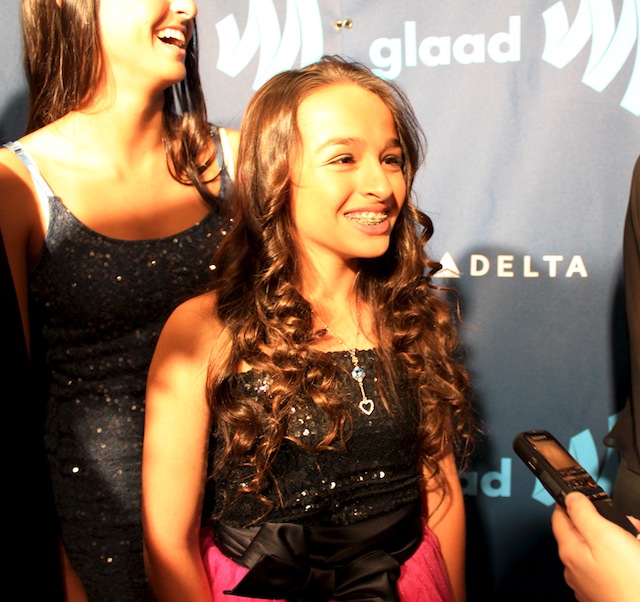
Jazz, age 12
copyright vanessa friedman
We asked Jazz how it felt to be a role model to so many humans at such a young age — “To me, the age doesn’t matter, just how you feel inside,” — and if she enjoys big media events like the GLAAD awards — “It’s overwhelming, but a lot of fun too. I like taking pictures, so.” Jazz’s family walked the red carpet with her, and we asked her mom, Jeanette, what advice she would give to parents’ of trans* kids. “They need to remember unconditional love is the most important thing. They need to check their egos at the door and put their child first.”
Next: Laverne Cox, Milla Jovovich, Mama June Shannon, Russell Simmons and more!
People in Glass Closets: Anderson Cooper and Straight Responses to Coming Out
By: Emily Manuel
So Anderson Cooper officially came out, writing in a post on Andrew Sullivan’s blog that “the fact is, I’m gay, always have been, always will be, and I couldn’t be any more happy, comfortable with myself, and proud.” To many people who’d been paying attention, it was a not a surprise. Cooper, like many other celebrities had long lived in a glass closet – known (or suspected) by many to be gay, but not publicly “out” as a gay man.
Many of the reactions from heterosexual progressives that I observed around social media in response were, to be blunt, really fucking annoying and entitled. The salacious shock, the studied boredom and cynicism, the jokes, the questions about why he took so long or why he needed to come out at all. And on and on.
Eve Kosofsky Sedgwick, in her landmark book Epistemology of the Closet, argues that
“closetness” itself is a performance initiated by the speech act of a silence – not a particular silence, but one that accrues particularity by fits and starts, in relation to the discourse that surrounds and differentially constitutes it.
What Sedgwick means is that to be closeted is only meaningful by its relation to heterosexual supremacy, heterosexual “normality.” Coming out, which only occurs in the first person, is a double statement – “I am [GLBTQ]” and “I am not [heterosexual and/or cis].” To not make this statement is to be very often, perhaps always, taken for heterosexual, because of what queer theorists like Sedgwick call heteronormativity.
Heteronormativity means, at its most basic, the assumption that one is, or should be, heterosexual. And it applies to almost everyone at every time – straight unless “proven” otherwise. It means, for queer people, negotiating a world in which coming out is a never-ending process. Few of us have national media coverage to speed the process, but even for a high-profile person like Cooper, coming out must have been a long process.
So when heterosexuals ask, “Why does Anderson Cooper have to come out as gay?” I reply: “Because you do not have to come out as heterosexual.”
Heterosexuals do announce their sexuality in public, all the time, of course. Walking down the street holding hands, kissing their lover, wearing wedding rings, clothing and other aesthetic codes. But it is not a movement from unacknowledged to public, it has no risk or social consequences in itself. In his coming out letter, Cooper notes that he didn’t come out because a reporter’s private life shouldn’t matter. Indeed. But part of the point is, being heterosexual isn’t private – it’s public.
Contrast this to the news stories which talk about Cooper “admitting” that he is gay, as though it were a crime he were confessing to. The analogy is not really so off, to be honest. Sodomy (the legal category covering anal and oral sex) wasn’t completely legal in the US until 2003 with the Lawrence versus Texas Supreme Court decision. It was a crime to be gay in Texas until then, to have sex in your own home. Criminal.
Even now, Americans like Mr Cooper still live in a country where there is no national anti-discrimination bill for such things as employment and housing. There are still parts of the country where it is completely legal to sack someone for being GLBT, or to refuse them housing, and where parents can lose custody of their children after coming out. Even in areas where there are local anti-discrimination laws, these are often still ineffective – it’s easy enough for a bigot to discriminate without being caught.
So there’s a good reason why so many people in the public eye wait to come out until after their career is largely over – because they may well lose their careers, or part of them. Coming out may cost them in their career or their relationships. And that is a fear that no straight person ever faces for their heterosexuality.
So when heterosexuals ask, “Why did it take so long for him to come out?” I reply with a question of my own: “Why did it take you so long to make him feel safe enough to do so?”
That’s the thing with heterosexuality. It’s not just about who you fuck – it’s a complicated set of norms and expectations about personal conduct, gendered and sexual behaviour, familial relationships, and so on. In his book, The Trouble With Normal, queer theorist Michael Warner argues that:
The received wisdom in straight culture, is that all of its different norms line up, that one is synonymous with the others. If you are born with male genitalia,* the logic goes, you will behave in masculine ways, desire women, desire feminine women, desire them exclusively, have sex in what are thought to be normally active and insertive ways and within officially sanctioned contexts, think of yourself as heterosexual, identify with other heterosexuals no matter how tolerant you might wish to be, and never change any part of this package from childhood to senescence. Heterosexuality is often a name for this entire package, even though attachment to the other sex is only one element. If you deviate at any point from this program, you do so at your own cost. And one of the things straight culture hates most is a sign that the different parts of the package might be recombined in an infinite number of ways. But experience shows that this is just what tends to happen. If heterosexuality requires the entire sequence, then it is very fragile. No wonder it needs so much terror to induce compliance.
A terrifying word, compliance. Part of what it means, of course, is a cultural solicitation of certain kinds of performances, a cultural enforcement of allowable identities. A public performance of heterosexuality, even for those we supposedly know are queer, is demanded.
It means terrifying the last generation of queers so this generation doesn’t have anyone to look up to. It means “minority stress,” that whether you are out or not, you cannot win, heterosexual dominance takes its toll either way. To be closeted is to be “dishonest,” to be out, “making a big deal.” It’s not just about the fundamentalists and the queer-bashers – good, decent liberal people with the best of intentions can make negotiating the heterosexual world tiring, traumatising and even occasionally dangerous.
When someone like Anderson Cooper comes out, it changes things, just a little bit. There’s one less glass closet in this world, one more tiny shift in the public sphere. So as a queer woman, I find cynicism and snark from heterosexual people who’ve never experienced the pressure of either the closet or outness just a little much. It’s not the sign of your comfort with queer culture that you might think it is, and it’s not particularly supportive. We still face immense pressure, and that requires your empathy and compassion, not your judgment.
*cissexist phrasing
Originally published on Tiger Beatdown. Republished WITH PERMISSION MOTHERF*CKERS.
Anderson Cooper Officially Comes Out: “The Fact Is, I’m Gay”
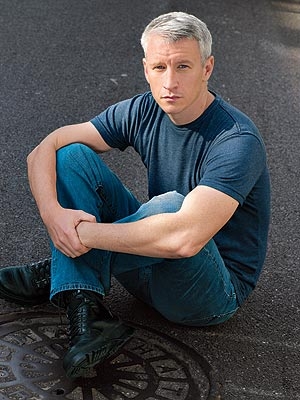 Anderson Cooper’s sexual orientation isn’t exactly a secret. He’d never announced it or anything, but he’d never lied about it, either, and he’s always seemed relatively uninhibited about appearing in public with his activity partner. But many wondered if he’d ever take the plunge and actually come out, publicly. Today, he did just that.
Anderson Cooper’s sexual orientation isn’t exactly a secret. He’d never announced it or anything, but he’d never lied about it, either, and he’s always seemed relatively uninhibited about appearing in public with his activity partner. But many wondered if he’d ever take the plunge and actually come out, publicly. Today, he did just that.
In Entertainment Weekly‘s cover story last week, entitled ‘The New Art of Coming Out,” the magazine noted that the coming out process for celebrities has changed quite a bit over the last few years and, furthermore, “this new blink-and-you’ll-miss-it style is an important hallmark of changing times.” Drawing from examples like Jim Parsons and Zachary Quinto, the magazine argues that “subtle” is the new “magazine cover” when it comes to coming out and, furthermore “coming out casually is, in its way, as activist as [Ellen] DeGeneres’ TIME cover, although few of these actors would probably choose to label themselves as such.”
Andrew Sullivan at The Daily Beast emailed Anderson Cooper asking for his take on the story and much to Sullivan’s surprise, in return he received an email which Cooper gave Sullivan permission to publish online. Here it is:
Andrew, as you know, the issue you raise is one that I’ve thought about for years. Even though my job puts me in the public eye, I have tried to maintain some level of privacy in my life. Part of that has been for purely personal reasons. I think most people want some privacy for themselves and the people they are close to.
But I’ve also wanted to retain some privacy for professional reasons. Since I started as a reporter in war zones 20 years ago, I’ve often found myself in some very dangerous places. For my safety and the safety of those I work with, I try to blend in as much as possible, and prefer to stick to my job of telling other people’s stories, and not my own. I have found that sometimes the less an interview subject knows about me, the better I can safely and effectively do my job as a journalist.
I’ve always believed that who a reporter votes for, what religion they are, who they love, should not be something they have to discuss publicly. As long as a journalist shows fairness and honesty in his or her work, their private life shouldn’t matter. I’ve stuck to those principles for my entire professional career, even when I’ve been directly asked “the gay question,” which happens occasionally. I did not address my sexual orientation in the memoir I wrote several years ago because it was a book focused on war, disasters, loss and survival. I didn’t set out to write about other aspects of my life.
Recently, however, I’ve begun to consider whether the unintended outcomes of maintaining my privacy outweigh personal and professional principle. It’s become clear to me that by remaining silent on certain aspects of my personal life for so long, I have given some the mistaken impression that I am trying to hide something – something that makes me uncomfortable, ashamed or even afraid. This is distressing because it is simply not true.
I’ve also been reminded recently that while as a society we are moving toward greater inclusion and equality for all people, the tide of history only advances when people make themselves fully visible. There continue to be far too many incidences of bullying of young people, as well as discrimination and violence against people of all ages, based on their sexual orientation, and I believe there is value in making clear where I stand.
The fact is, I’m gay, always have been, always will be, and I couldn’t be any more happy, comfortable with myself, and proud.
I have always been very open and honest about this part of my life with my friends, my family, and my colleagues. In a perfect world, I don’t think it’s anyone else’s business, but I do think there is value in standing up and being counted. I’m not an activist, but I am a human being and I don’t give that up by being a journalist.
Since my early days as a reporter, I have worked hard to accurately and fairly portray gay and lesbian people in the media – and to fairly and accurately portray those who for whatever reason disapprove of them. It is not part of my job to push an agenda, but rather to be relentlessly honest in everything I see, say and do. I’ve never wanted to be any kind of reporter other than a good one, and I do not desire to promote any cause other than the truth.
Being a journalist, traveling to remote places, trying to understand people from all walks of life, telling their stories, has been the greatest joy of my professional career, and I hope to continue doing it for a long time to come. But while I feel very blessed to have had so many opportunities as a journalist, I am also blessed far beyond having a great career.
I love, and I am loved.
In my opinion, the ability to love another person is one of God’s greatest gifts, and I thank God every day for enabling me to give and share love with the people in my life. I appreciate your asking me to weigh in on this, and I would be happy for you to share my thoughts with your readers. I still consider myself a reserved person and I hope this doesn’t mean an end to a small amount of personal space. But I do think visibility is important, more important than preserving my reporter’s shield of privacy.
It’s hard to believe now, but it wasn’t that long ago that nobody had heard of Anderson Cooper. The son of Gloria Vanderbilt (yes, those Vanderbilts) and her third husband Wyatt Cooper, Cooper really broke out onto the national radar in a major way during Hurricane Katrina, when he was one of the few television reporters working aggressively and ambitiously to tell the real story of the devastation there. On the fourth day of coverage, Cooper incredulously challenged a Louisiana senator who praised George W. Bush’s allegedly supportive actions on live television and shortly thereafter, cried on camera, thus earning him the “emo anchor” moniker. It was a turning point in his career.
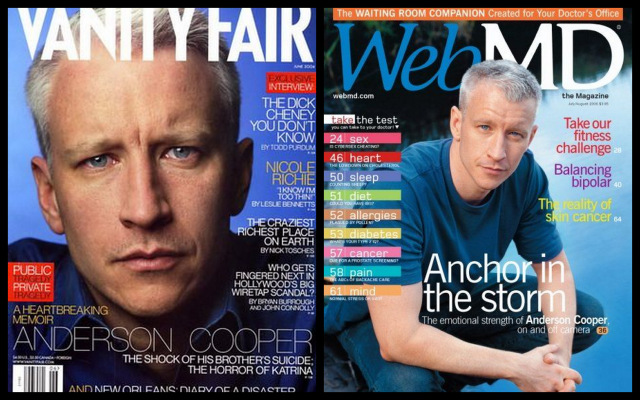
Born in 1967, Anderson grew up in a five-story mansion on 67th and a penthouse duplex at 10 Gracie Square, consecutively. At ten, his father died of a sudden heart attack, and shortly before Anderson was due to start his freshman year at Yale, Anderson’s older brother killed himself, which was cited as “the precipitating event for his career as a journalist.” After college, Anderson began traveling to war-torn or otherwise engaged-in-a-serious-conflict locales, such as Bosnia, Rwanda and Thailand, where he made his own video newscasts to sell to Channel One. His mother recalls that Anderson was never “content living the privileged, pampered life of a New York gentleman.”
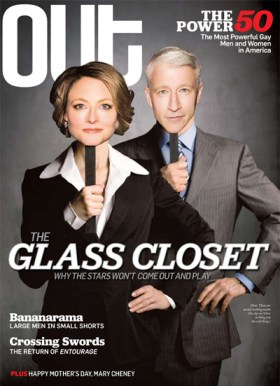
April 2007 magazine cover – one of many attempts to coax Cooper out of the closet
In early 2002, Anderson got a job co-hosting with Paula Zahn, which led to Anderson subbing for Aaron Brown on NewsNight, which lead to Anderson getting his own show, Anderson Cooper 360.
In 2005, reporter Jonathan Van Meter met up with Cooper for a New York Magazine story, a few months prior to Hurricaine Katrina. Early on, a nervous Cooper asks Van Meter, “Why are you interested in writing an article about me?” Van Meter then explains why “there was a sense that Cooper seemed to be on the cusp of some sort of career breakthrough.” Van Meter was correct, and as Anderson’s fame picked up, so did speculation about his sexuality.
Van Meter wrote:
There has been a lot of chatter on the Internet about the fact that Cooper may or may not be gay, and Village Voice columnist Michael Musto has taken pleasure in quoting the gay magazine Metrosource, which has referred to Cooper as “the openly gay news anchor.” It has been assumed in certain circles in New York partly because he lives what looks to some to be a gay social life. He’s often seen at parties with Barry Diller, and he’s friends with the lead singer from the outré gay rock band the Scissor Sisters. And then there was the tempest in a teapot regarding a slightly heated interview last fall with Jerry Falwell about gay marriage. Some Cooper-obsessed bloggers insist that the anchor outed himself on the air, taking the gay side of the debate and saying, “We pay taxes.” They claim CNN originally posted a transcript with the “we” and then later changed it to “You pay taxes.” Cooper has maintained all along that he said “you.”
When I bring up the sexuality issue with Cooper, he says, “You know, I understand why people might be interested. But I just don’t talk about my personal life. It’s a decision I made a long time ago, before I ever even knew anyone would be interested in my personal life. The whole thing about being a reporter is that you’re supposed to be an observer and to be able to adapt with any group you’re in, and I don’t want to do anything that threatens that.”
When that interview happened Cooper would’ve been the only out news anchor on television. Now, he’s joined by other known homos such as MSNBC’s Rachel Maddow, HLN’s Jane Velez-Mitchell, CNN’s Don Lemon, Good Morning America’s Robin Roberts and FOX’s Shepard Smith.
It may have taken nearly a decade to get here — but we’re here. We’re everywhere.
Adele’s Anderson Cooper Interview Will Ignite Or Enhance Your Crush on Adele
You probably already love Adele. Apparently, The Recording Academy agrees, as was indicated by her domination of last night’s award ceremony, which I believe somebody who works at this website is presently writing about in depth.
Anyhow — if you think you love Adele now but you haven’t seen her charming interview with Anderson Cooper from last night, then you have no idea how much more room there is in your heart for loving Adele! If she was the friend of your friend, you’d probably meet her and be like, “I want Adele to be MY friend, she’s so funny!” and also so honest, and swears a lot.